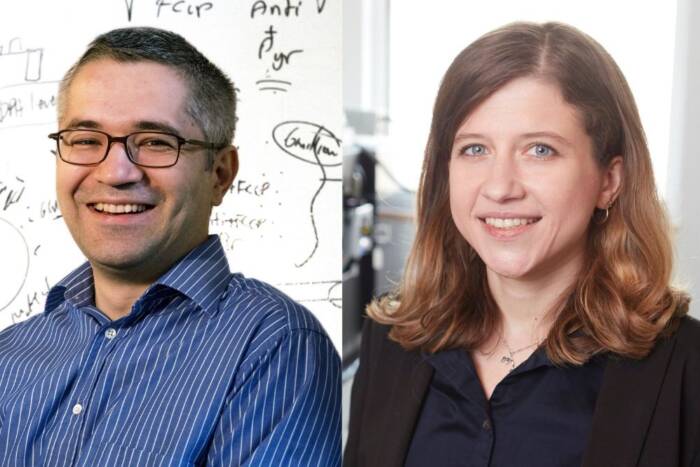Funding from Kavli Foundation to establish new institute at Rockefeller devoted to neuroscience
The Kavli Foundation and The Rockefeller University today announced the formation of the Kavli Neural Systems Institute (Kavli NSI) at Rockefeller, funded by a $20 million endowment supported equally by Kavli and Rockefeller. The Institute will become part of a network of seven Kavli Institutes carrying out fundamental research in neuroscience, and a broader network of 20 Kavli Institutes dedicated to astrophysics, nanoscience, neuroscience, and theoretical physics.
The Kavli NSI at Rockefeller represents a portion of a $100 million commitment of new funds to enable research aimed at deepening our understanding of the brain and brain-related disorders, such as traumatic brain injuries, Alzheimer’s disease, and Parkinson’s disease. Other Kavli institutes devoted to neuroscience are being created at Johns Hopkins University and the University of California, San Francisco, and Kavli Institute endowments are being further built at four other universities—Columbia University, the University of California, San Diego, Yale University, and the Norweigen University of Science and Technology.
The Kavli NSI at Rockefeller will promote interdisciplinary research and learning to tackle the biggest questions in neuroscience through high-risk, high-reward projects and the development of new research technologies.
“Kavli’s investment in neuroscience at Rockefeller will enable us to create and share new research approaches and laboratory technologies to capture the possibilities of neuroscience from the micro to the macro level,” says Rockefeller President Marc Tessier-Lavigne. “For example, Rockefeller scientists are currently developing a number of tools to push neuroscience forward, including advanced neuronal recording capabilities, sophisticated three-dimensional imaging, and non-invasive activation of neural circuits, among others.”
“It is a real pleasure to join The Rockefeller University in announcing their new Kavli Neural Systems Institute,” says Robert W. Conn, president and CEO of The Kavli Foundation. “Rockefeller is unrelenting in its focus on excellence and independent thinking, and is well-known for its non-traditional structure and approach to research. The new institute will provide Rockefeller’s stellar faculty with unique, unrestricted funding to explore their best ideas early and move ahead towards solving the most challenging problems in neuroscience, problems that must be understood at their most fundamental level if we are to address the many debilitating diseases and disorders that affect the mind.”
The Kavli NSI aims to draw on The Rockefeller University’s culture of creativity and excellence to solve the most challenging problems in neuroscience, such as: how the astonishing array of cell types in the brain arise from a single fertilized egg; how the brain processes information so rapidly; and how the brain and nervous system control complex behaviors. The long-term goal is to reach an integrated understanding of the brain as a neural system that supports complex, higher cognitive functions.
The convergence of neuroscience with such fields as bioengineering, nanoscience, and computer science, as well as mathematics and theoretical and experimental physics, will accelerate in the coming decades. The impact of this scientific convergence is evident in Rockefeller University’s neuroscience laboratories, which are seeded with investigators trained in physics, engineering, and computer science.
The Kavli NSI will enable Rockefeller scientists to fast-track their collaborations with individuals outside of the life sciences. It will also provide much-needed seed funding that will allow Rockefeller investigators to launch high-risk, high-reward research initiatives.
Thirty-six Rockefeller faculty members, will join Kavli NSI. Among these will be faculty in the early stages of the careers and members of the Center for Studies in Physics and Biology, which was founded by neuroscientist Torsten N. Wiesel, president emeritus of The Rockefeller University, to unite physicists and biologists around common biomedical problems, particularly those of neuroscience.
“We’re reaching a phase where many of the tools we need to make new discoveries in neuroscience are coming from the physical sciences into biology—these include the hard tools, or technologies, but also conceptual tools. Rockefeller’s neuroscience labs are in the vanguard of this change, and the new Kavli Institute will help us codify this culture,” says Cori Bargmann, Torsten N. Wiesel Professor at The Rockefeller University and head of the Lulu and Anthony Wang Laboratory of Neural Circuits and Behavior.
Bargmann will serve as co-director of Kavli NSI with Jeffrey M. Friedman, Marilyn M. Simpson Professor and head of the Laboratory of Molecular Genetics.
Bargmann studies the relationship between genes, neural circuits, and behavior in the worm C. elegans, a model organism in neuroscience. She served as co-chair of the National Institutes of Health working group for the BRAIN Initiative, which outlined a 12-year scientific vision for the project. In 2012, she was one of three scientists who were awarded the Kavli Prize in Neuroscience “for elucidating basic neuronal mechanisms underlying perception and decision.”
Friedman’s research focuses on the molecular mechanisms that regulate food intake and body weight. He has received Lasker and Gairdner Awards for his discovery of leptin, a hormone that interacts with receptors in the brain to regulate food intake and energy expenditure.
Kavli NSI’s associate director will be Leslie B. Vosshall, Robin Chemers Neustein Professor and head of the Laboratory of Neurogenetics and Behavior. She studies fruit flies and mosquitoes to understand how the nervous system processes and perceives odors.
“Our focus is on developing a deeper understanding of the configuration and function of the mind and brain,” says Tessier-Lavigne, who is Carson Family Professor and head of the Laboratory of Brain Development and Repair. “The success of the Kavli Neural Systems Institute at Rockefeller will be measured by how far we have departed from our current neuroscience research portfolio 20 years from now.”


